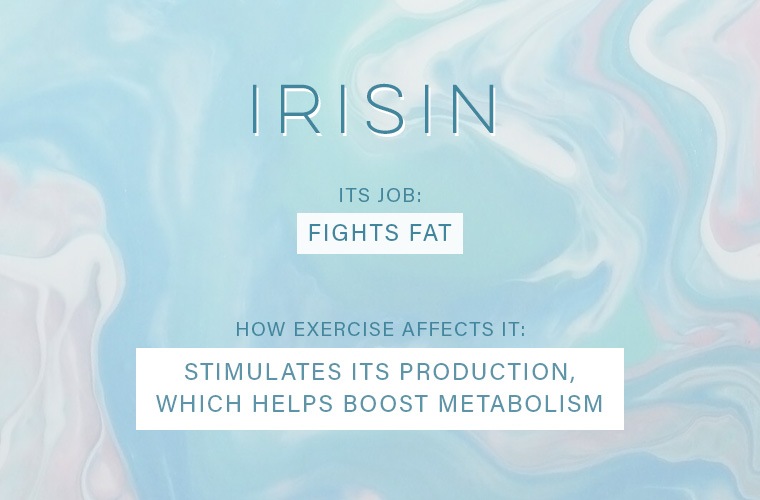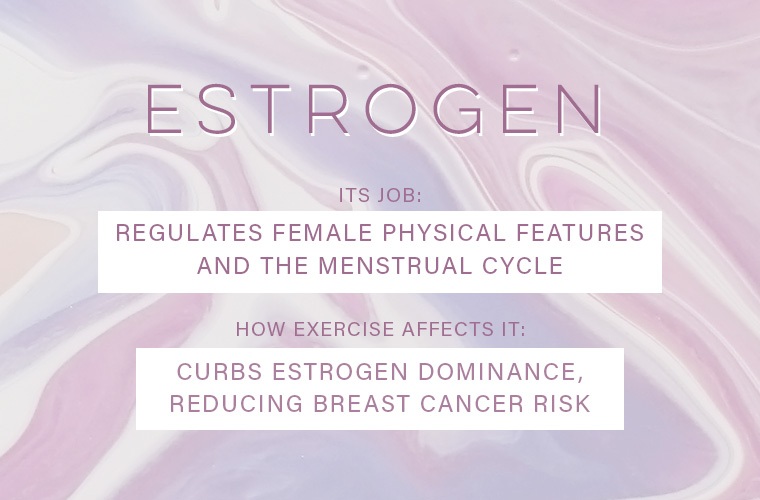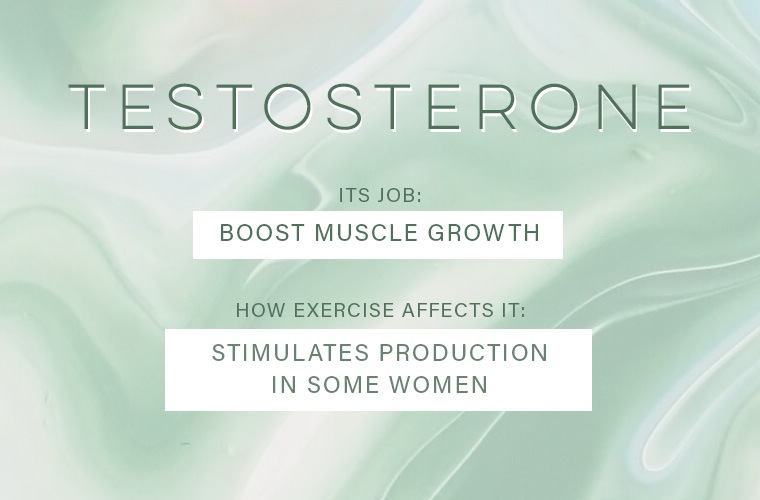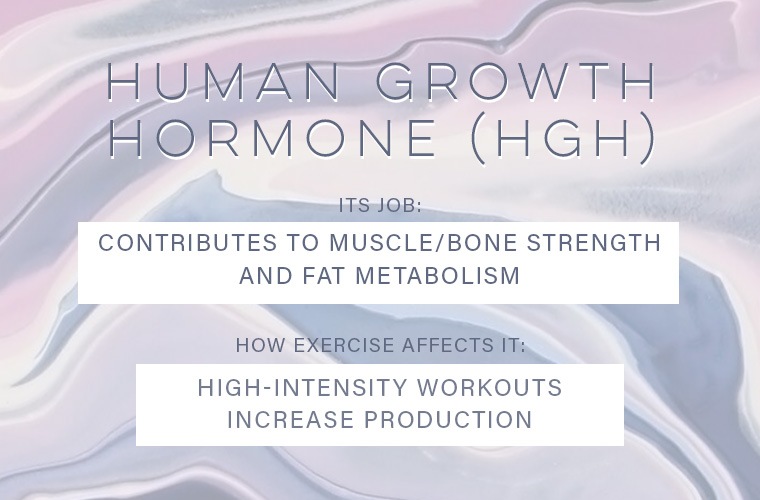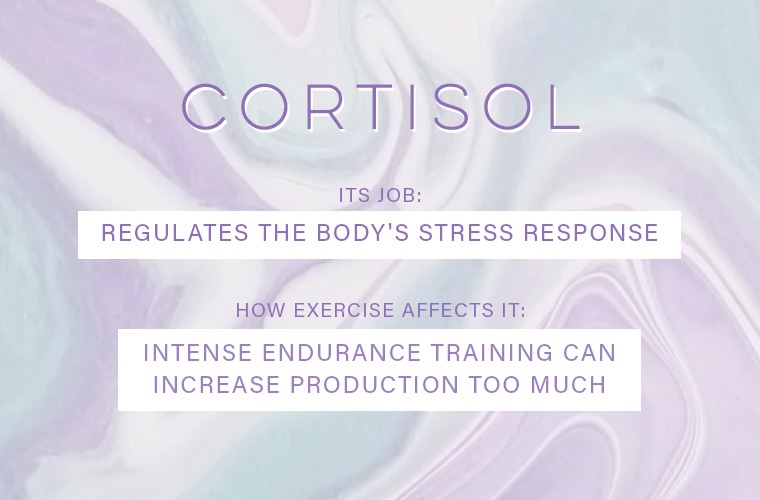Our editors independently select these products. Making a purchase through our links may earn Well+Good a commission
The 5 hormones every active woman needs to know about
Here's how regular exercise helps balance five major hormones—irisin, estrogen, testosterone, HGH, and cortisol—and why each is key to your overall health.
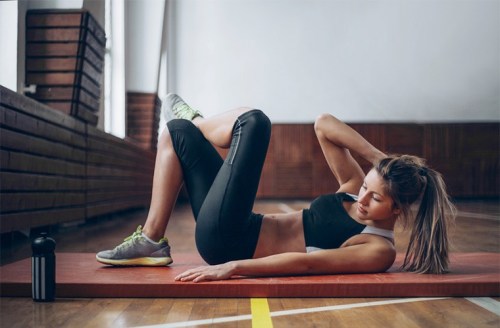
Hormones are one of your body’s main signaling systems. Think of them as tiny traffic cops: They direct biochemical messages that regulate everything from your sex drive to your metabolism, mood, sleep, and fertility.
Given the amount of information they’re responsible for ferrying, it’s easy to see how mixed signals might affect the way you feel and function. One natural way to help keep your hormones in balance, however, is through exercise—and science is still discovering just how good a sweat session can be for your overall health.
“We’re learning that your muscle serves as another endocrine organ that plays a key role in metabolism.”
“Increasingly, we’re learning that your muscle serves as another endocrine organ that plays a key role in metabolism by talking to other organs such as the fat tissue, brain, and liver, and most certainly, by releasing hormones,” says Sara Gottfried, MD, author of The Hormone Cure and The Hormone Reset Diet.
In particular, Dr. Gottfried says five hormones are influenced by your fitness routine: irisin, estrogen, testosterone, human growth hormone, and cortisol.
So getting green lights from this group can put you on a fast track toward becoming you healthiest, happiest self.
Here’s what each hormone does—and how exercise can improve its performance.
Irisin
Its job: Irisin is literally referred to as the exercise hormone, which basically makes it your biological workout buddy. Recent research has shown it battles fat on two fronts: First by activating genes that turn bad white fat into good brown fat, and also by regulating undifferentiated stem cells to become bone-building cells instead of fat storage. It may also protect brain cells from injury and aging.
How exercise affects it: Getting sweaty stimulates your body’s irisin production. In one small trial, single afternoon sessions of both moderate intensity exercise and HIIT raised levels of the hormone by 12 percent among obese women; in another study, single sessions of both intense endurance exercise and strength training increased irisin—all the more reason women should hit the heavy weights.
“One of the best ways to turn on irisin is to perform intermittent fasting for 18 hours and follow it with moderate exercise or HIIT training,” Dr. Gottfried says. But even if you can’t follow that protocol, you’ll likely get an irisin boost just from working up a sweat.
Estrogen
Its job: Estrogen is the most important female sex hormone, playing a major role in the development of physical features like breasts, the menstrual cycle, and reproduction. It also affects bone health, cholesterol, and more, making it the master multitasker of your endocrine system.
How exercise affects it: Women need estrogen, but too much is a major risk factor for breast cancer. And many have excess estrogen circulating for several reasons related to modern life—everything from pesticides to the pill. “Most women, starting around age 35, develop estrogen dominance. Exercise helps to reverse this trend, leading to lower risk of breast cancer for premenopausal and postmenopausal women alike,” Dr. Gottfried explains. In fact, not only does exercise reduce breast cancer risk (phew!), it also reduces mortality after diagnosis and among survivors.
Testosterone
Its job: Testosterone is the male sex hormone, but it’s produced in women’s bodies, too (just in smaller amounts). It plays a major role in helping to grow muscle, and is responsible for repairing muscle proteins damaged by exercise.
How exercise affects it: “When studies control for menstrual cycle and are performed in lean women, exercise stimulates production of testosterone,” says Dr. Gottfried (The data, however, is mixed among older women and those who are overweight or obese). Testosterone’s health benefits for women include everything from boosting your sex drive to helping increase muscle mass and reduce excess belly fat.
Human growth hormone (HGH)
Its job: HGH plays many roles in your body’s basic functions, including contributing to muscle and bone strength, but the reason it really racks up praise-hand emojis is its ability to regulate fat metabolism.
How exercise affects it: Your body releases HGH periodically on its own, especially during sleep, but certain kinds of exercise have been shown to stimulate major production increases. Specifically high-intensity workouts that involve serious resistance (i.e. heavy weights!) and explosive movement (the type that leaves you breathless real quick), as opposed to endurance exercise.
Cortisol
Its job: You may have heard cortisol referred to as the stress hormone—and for good reason. It’s essentially in charge of regulating changes in the body that happen in response to anxiety and tension. Those feeling the pressures of modern life (file under: everyone) generally have excess cortisol circulating, which increases abdominal fat.
How exercise affects it: Studies have shown low-intensity exercise may decrease cortisol levels (or, at the very least, not affect them at all), while moderate to high-intensity exercise may increase cortisol. That increase is generally seen as acute as opposed to chronic, though, meaning it won’t have long-term effects.
The one kind of exercise that doeslead to chronic cortisol increase is intense endurance training. “If you’re an endurance athlete, you’ll need additional measures to counteract oxidative stress and high levels of cortisol, such as taking supplemental vitamin C,” Dr. Gottfried advises. For everyone else, “aim for targeted, smart overload followed by adequate and active rest.”So go ahead and catch your breath—doctor’s orders.
Curious what else regular exercise can do for you? Here are five more ways it can make you healthier and happier.
Sign Up for Our Daily Newsletter
Get all the latest in wellness, trends, food, fitness, beauty, and more delivered right to your inbox.
Got it, you've been added to our email list.
